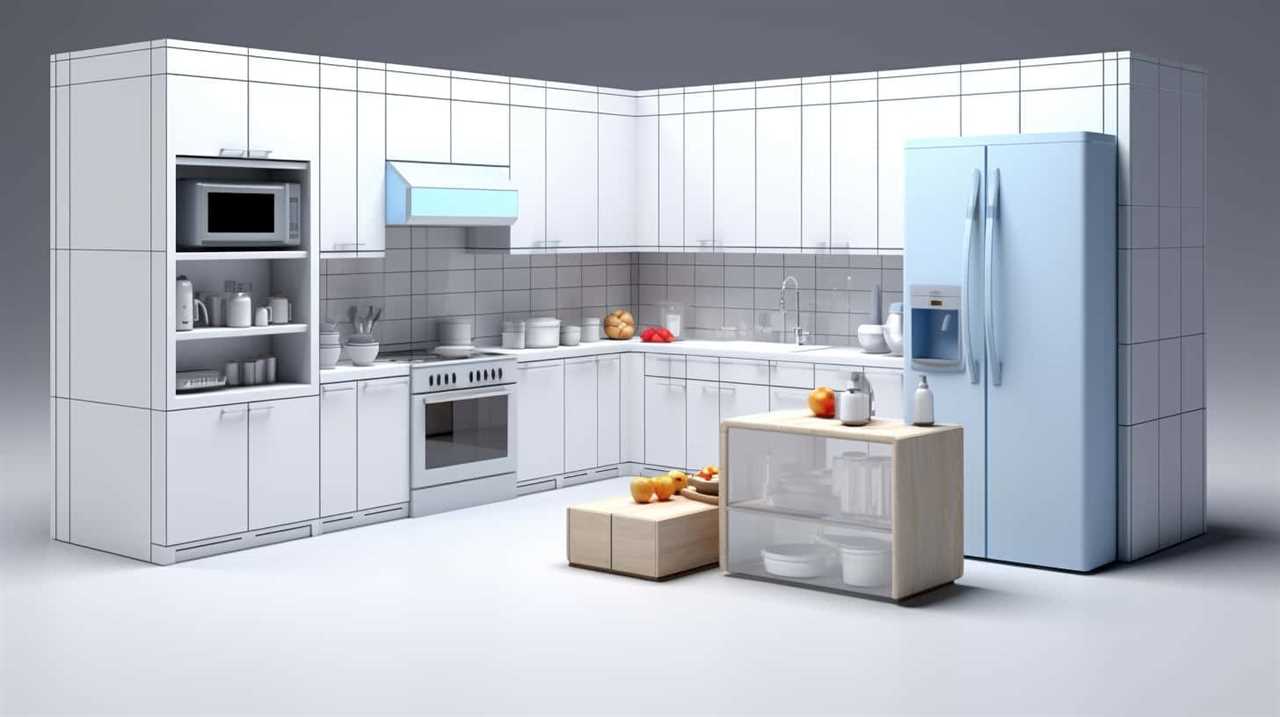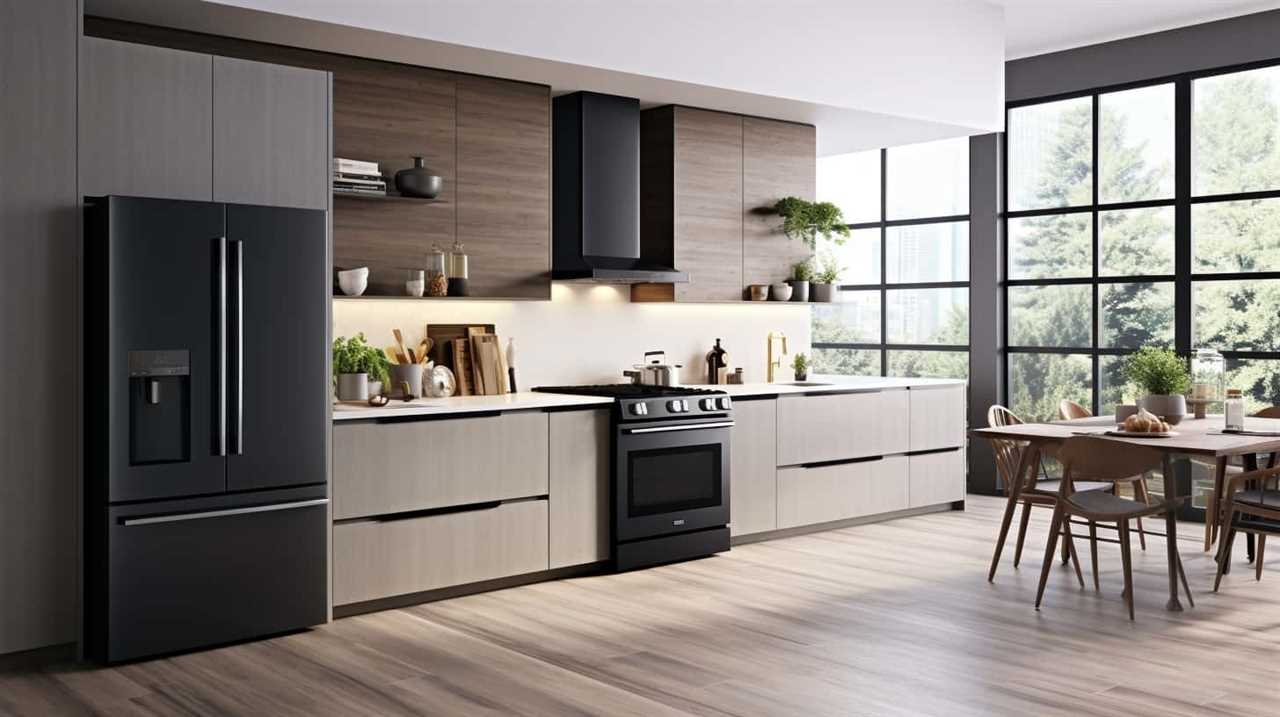
Do you believe that energy-efficient appliances are just a marketing ploy? Think again! We, the experts, are here to educate you on the amazing advantages these appliances provide for the environment.
By opting for energy-efficient appliances, we can actively contribute to reducing greenhouse gas emissions, conserving natural resources, decreasing air pollution, and consuming lower amounts of energy.
It’s not just about saving a few bucks on your electricity bill; it’s about making a real impact on the planet we call home. With these appliances, we can mitigate climate change, improve indoor air quality, promote sustainable living, and protect biodiversity.
So, let’s dive into the details and discover the four astonishing ways energy-efficient appliances benefit our environment.

Key Takeaways
- Energy-efficient appliances significantly decrease energy consumption in homes, leading to lower greenhouse gas emissions.
- Energy-efficient appliances maximize the use of available energy and contribute to water conservation.
- Energy-efficient appliances reduce air pollution, improve air quality, and encourage the use of clean energy sources.
- Energy-efficient appliances help lower the carbon footprint of households and businesses by using less energy and reducing carbon emissions.
Reduced Greenhouse Gas Emissions
Reduced greenhouse gas emissions occur when energy-efficient appliances are used. By utilizing energy efficient technologies, such as appliances with high Energy Star ratings, we can significantly decrease the amount of energy consumed in our homes. This reduced energy consumption directly translates into lower greenhouse gas emissions, which play a major role in climate change.
According to the U.S. Environmental Protection Agency (EPA), residential energy consumption accounts for approximately 20% of total greenhouse gas emissions in the United States. By investing in energy-efficient appliances, we can contribute to a substantial reduction in these emissions. For instance, replacing an old, energy-intensive refrigerator with a new, energy-efficient model can result in a 50% reduction in energy consumption, leading to a significant decrease in greenhouse gas emissions.
Moreover, energy-efficient appliances not only reduce greenhouse gas emissions, but they also save us money. By consuming less energy, these appliances lower our utility bills, making them a cost-effective choice in the long run. Additionally, their advanced technologies and features often result in improved performance and durability, further enhancing their value.
In conclusion, the use of energy-efficient appliances leads to reduced energy consumption and subsequently lower greenhouse gas emissions. By investing in these technologies, we not only contribute to a healthier environment but also enjoy financial savings.
Now, let’s explore how energy efficiency contributes to the conservation of natural resources.
Conservation of Natural Resources
Energy-efficient appliances contribute to the conservation of natural resources by maximizing the use of available energy and minimizing waste. This conservation extends beyond just energy to include other valuable resources such as water. By reducing water consumption, energy-efficient appliances play a crucial role in promoting sustainable living.
Water conservation is an integral part of sustainable living, as water scarcity continues to be a global concern. Energy-efficient appliances, such as dishwashers and washing machines, are designed to use less water without compromising performance. For example, modern dishwashers use sensors to determine the appropriate amount of water needed for each load, resulting in significant water savings compared to older models.
Additionally, energy-efficient appliances that incorporate water-saving features, like low-flow showerheads and faucets, further contribute to the conservation of water. These appliances are designed to maintain the desired water pressure while reducing the overall amount of water used, thus promoting sustainable water usage habits.

By investing in energy-efficient appliances, individuals can actively participate in the conservation of water resources. This not only helps preserve this precious resource but also supports a more sustainable and environmentally conscious lifestyle.
As we strive for a future with limited resource depletion, energy-efficient appliances pave the way for a greener and more sustainable future.
Decreased Air Pollution
Energy-efficient appliances play a crucial role in reducing air pollution and improving air quality.
By consuming less energy, these appliances release fewer carbon emissions into the atmosphere, leading to a decrease in greenhouse gas emissions.

This reduction in carbon emissions not only helps combat climate change but also contributes to cleaner air and healthier living environments for all.
Cleaner Air Quality
Improving air quality is one of the significant benefits of using energy-efficient appliances. By reducing energy consumption, these appliances help decrease the reliance on fossil fuels, leading to cleaner air and decreased air pollution.
Here are five key ways energy-efficient appliances contribute to cleaner air quality:
- Energy-efficient appliances consume less electricity, resulting in lower emissions from power plants.
- They encourage the use of clean energy sources such as solar and wind power.
- Energy-efficient appliances reduce the need for additional power generation, reducing the overall pollution caused by power plants.
- They minimize the release of greenhouse gases like carbon dioxide, which contribute to air pollution and climate change.
- Energy-efficient appliances promote the adoption of renewable energy alternatives, further reducing air pollution and improving air quality.
Reduced Carbon Emissions
One significant benefit of energy-efficient appliances is their contribution to reducing carbon emissions and decreasing air pollution. By using less energy to operate, these appliances help to lower the carbon footprint of households and businesses, resulting in a positive environmental impact.

To illustrate the impact of energy-efficient appliances on carbon emissions, let’s take a look at the following table:
| Appliance | Energy Consumption (Old Model) | Energy Consumption (Energy-Efficient Model) |
|---|---|---|
| Refrigerator | 2000 kWh/year | 800 kWh/year |
| Washing Machine | 500 kWh/year | 200 kWh/year |
| Air Conditioner | 1500 kWh/year | 600 kWh/year |
As you can see, energy-efficient appliances consume significantly less energy compared to their older counterparts. This reduction in energy consumption directly translates into lower carbon emissions, helping to minimize the environmental impact and improve air quality. By embracing energy-efficient appliances, we can contribute to a cleaner and more sustainable future.
Lower Energy Consumption
When it comes to lower energy consumption, energy-efficient appliances offer two significant benefits.
Firstly, these appliances reduce carbon emissions by consuming less energy, helping to combat climate change.

Secondly, they result in long-term cost savings for consumers, as they consume less electricity and therefore lower utility bills.
Reduced Carbon Emissions
Energy-efficient appliances significantly decrease carbon emissions by consuming less energy. This reduction in energy consumption leads to several environmental benefits, including:
- Reduced fuel consumption: Energy-efficient appliances require less fuel or electricity to operate, resulting in reduced reliance on fossil fuels and other non-renewable energy sources.
- Lower greenhouse gas emissions: By using less energy, these appliances release fewer greenhouse gases into the atmosphere, helping to mitigate climate change.
- Preservation of natural resources: Energy conservation through the use of efficient appliances helps preserve finite resources like oil, coal, and natural gas.
- Improved air quality: As energy consumption decreases, so does the release of pollutants from power plants, leading to cleaner air and better respiratory health.
- Protection of ecosystems: Lower carbon emissions contribute to the preservation of ecosystems and biodiversity, as climate change can disrupt fragile habitats.
By reducing carbon emissions and promoting sustainable practices, energy-efficient appliances play a vital role in protecting the environment and ensuring a sustainable future.
Transitioning into the subsequent section on ‘long-term cost savings’, it’s important to note that in addition to their environmental benefits, energy-efficient appliances also offer significant financial advantages.

Long-Term Cost Savings
To further highlight the benefits of energy-efficient appliances, let’s explore the substantial long-term cost savings they offer through lower energy consumption.
Investing in energy-efficient appliances not only contributes to a greener environment but also provides significant long-term financial benefits. By consuming less energy, these appliances help reduce electricity bills, resulting in substantial savings over time. In fact, studies have shown that energy-efficient appliances can save households hundreds of dollars each year.
The energy savings achieved through these appliances can be quite impressive, with some models using up to 50% less energy than their conventional counterparts. These long-term cost savings make energy-efficient appliances a smart and economical choice for consumers.
As we consider the financial benefits, it becomes clear that energy-efficient appliances play a crucial role in mitigating climate change.

Mitigation of Climate Change
In our efforts to mitigate climate change, we’ve seen the significant impact that energy-efficient appliances can make. These appliances play a crucial role in reducing greenhouse gas emissions and promoting a sustainable future. Here are five reasons why energy-efficient appliances are important in the fight against climate change:
- Reduced energy consumption: Energy-efficient appliances consume less electricity, which means less reliance on fossil fuels and lower carbon dioxide emissions.
- Lower greenhouse gas emissions: By decreasing energy consumption, energy-efficient appliances help to reduce the release of greenhouse gases into the atmosphere, such as carbon dioxide and methane.
- Increased use of renewable energy sources: Energy-efficient appliances encourage the adoption of renewable energy sources, such as solar or wind power, as they require less energy to operate.
- Long-term sustainability: Using energy-efficient appliances promotes a more sustainable lifestyle by conserving resources and reducing the overall environmental impact.
- Global environmental benefits: The widespread use of energy-efficient appliances can have a global impact, contributing to the reduction of climate change effects worldwide.
Preservation of Ecosystems
Energy-efficient appliances play a vital role in the preservation of ecosystems. By reducing carbon emissions, these appliances help mitigate the negative impacts of climate change on ecosystems.
Additionally, they conserve natural resources by minimizing the amount of energy required for operation, which in turn reduces the extraction and processing of these resources.
Lastly, energy-efficient appliances help minimize our ecological footprint by using less energy and thereby reducing the overall strain on ecosystems.

Reduced Carbon Emissions
We frequently witness the preservation of ecosystems through reduced carbon emissions when we use energy-efficient appliances. By minimizing the amount of greenhouse gases released into the atmosphere, these appliances play a crucial role in mitigating climate change and protecting our environment.
Here are some key ways in which energy-efficient appliances contribute to the reduction of carbon emissions:
- Energy-efficient appliances consume less electricity, resulting in lower carbon emissions from power plants.
- Advanced technologies and design features in these appliances optimize energy usage, further reducing carbon footprint.
- Energy-efficient appliances promote renewable energy sources by requiring less electricity, thereby decreasing reliance on fossil fuels.
- The production of energy-efficient appliances involves sustainable manufacturing practices, resulting in reduced environmental impact.
- The long lifespan and durability of energy-efficient appliances reduce the need for frequent replacements, minimizing carbon emissions associated with manufacturing and disposal.
Conserves Natural Resources
By conserving natural resources, energy-efficient appliances contribute to the preservation of ecosystems. These appliances are designed to minimize the amount of energy they consume during operation, which helps to conserve energy resources such as fossil fuels.
Traditional appliances consume large amounts of electricity, contributing to the depletion of these resources and the subsequent release of greenhouse gases. Energy-efficient appliances, on the other hand, incorporate sustainable practices that reduce their energy consumption and carbon emissions. This not only helps to conserve non-renewable resources but also reduces the negative impact on the environment.
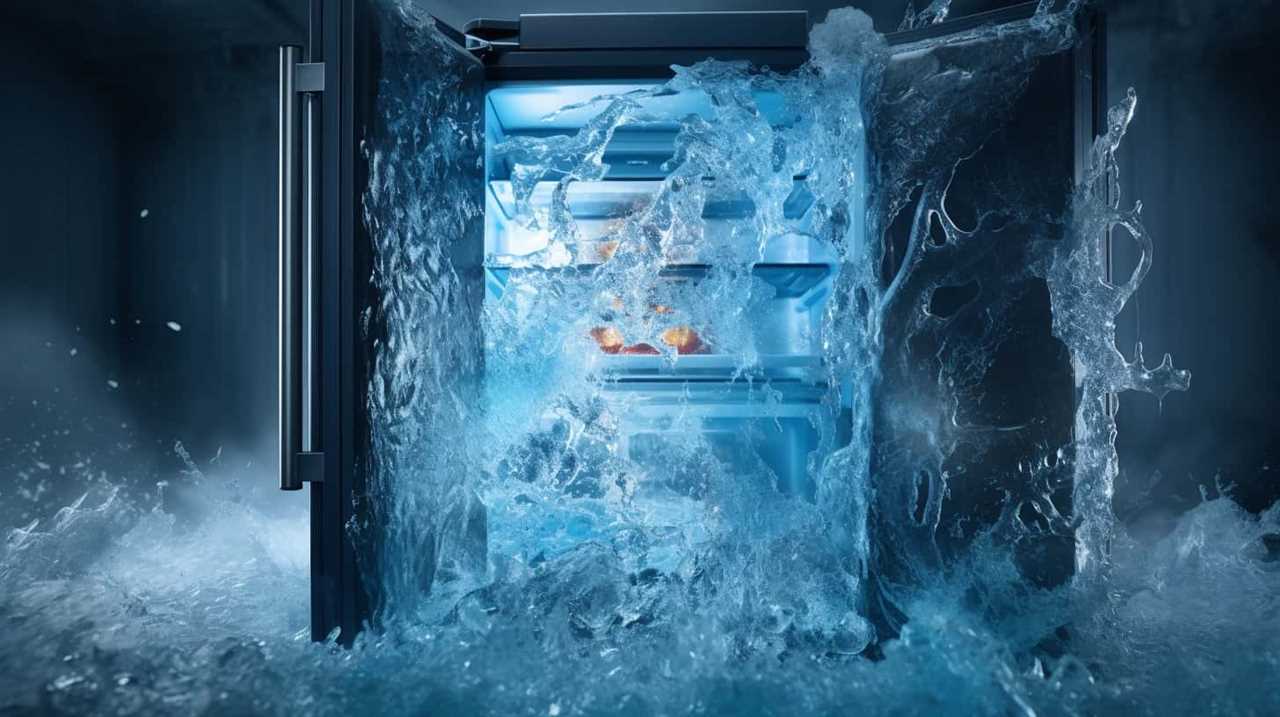
Minimizes Ecological Footprint
To further reduce our impact on the environment, let’s explore how energy-efficient appliances minimize our ecological footprint. Energy-efficient appliances play a crucial role in ecological preservation and environmental sustainability. Here are five ways they contribute to minimizing our ecological footprint:
- Reduced energy consumption: Energy-efficient appliances consume less electricity, resulting in lower greenhouse gas emissions and reduced strain on power grids.
- Conservation of natural resources: By using energy more efficiently, these appliances contribute to the preservation of valuable resources like coal, oil, and natural gas.
- Decreased pollution: Energy-efficient appliances produce fewer emissions, including pollutants like carbon dioxide and sulfur dioxide, which helps maintain the quality of our air and water.
- Preservation of ecosystems: By reducing our dependence on fossil fuels, energy-efficient appliances help protect ecosystems from the destructive effects of resource extraction.
- Long-term sustainability: By promoting energy efficiency, we contribute to a more sustainable future that balances our needs with the preservation of the environment.
Minimization of Water Usage
Energy-efficient appliances minimize water usage by incorporating advanced technologies and innovative designs. Water conservation is a critical aspect of environmental sustainability, and energy-efficient appliances play a significant role in reducing water consumption. By optimizing water usage, these appliances not only contribute to preserving this precious resource but also offer several benefits for the environment.
One of the primary ways energy-efficient appliances minimize water usage is through the implementation of efficient water-saving features. For example, dishwashers with sensor technology can detect the level of dirtiness in dishes and adjust the water usage accordingly, saving significant amounts of water compared to traditional models. Similarly, washing machines equipped with advanced water-recycling systems can reuse water from previous cycles, reducing the overall water consumption.
In addition to water-saving features, energy-efficient appliances also contribute to water conservation indirectly through their energy-saving capabilities. By reducing energy consumption, these appliances lower the demand for energy production, which in turn reduces water usage in power generation. Traditional power plants often rely on water for cooling purposes, consuming vast amounts of water in the process. By using energy-efficient appliances, we can decrease the need for energy production, thereby minimizing water consumption associated with power generation.

Reduction of Waste Production
In terms of waste reduction, another significant advantage of energy-efficient appliances is their ability to minimize the production of waste through innovative features and technologies. Here are five ways in which energy-efficient appliances contribute to waste reduction:
- Extended Lifespan: Energy-efficient appliances are designed to be more durable and have longer lifespans compared to traditional appliances. This means less frequent replacement and disposal of appliances, reducing waste generation.
- Recyclable Materials: Many energy-efficient appliances are made using recyclable materials, reducing the need for raw materials extraction and minimizing waste from the manufacturing process.
- Sustainable Manufacturing: Energy-efficient appliances are often manufactured using sustainable practices that prioritize waste reduction. Manufacturers strive to minimize waste during production, reuse and recycle materials whenever possible, and implement efficient manufacturing processes.
- Packaging Reduction: Energy-efficient appliances often come with minimal and eco-friendly packaging. Manufacturers are increasingly using recycled or recyclable materials for packaging, reducing waste generated from packaging materials.
- E-waste Management: Energy-efficient appliances are typically more energy-efficient and environmentally friendly. This means that when these appliances reach the end of their lifespan, they’re less likely to end up in landfills, reducing the environmental impact of electronic waste.
Reducing waste production through energy-efficient appliances is just one of the many ways these appliances benefit the environment. In addition to waste reduction, energy-efficient appliances also contribute to improved indoor air quality.
Improved Indoor Air Quality
One major advantage of energy-efficient appliances is their contribution to healthier indoor air quality. By implementing energy conservation measures such as using appliances with higher energy efficiency ratings, we can significantly reduce the release of harmful pollutants into our homes. This improvement in air quality has a direct impact on our health and well-being.
To illustrate the positive effects of energy-efficient appliances on indoor air quality, let’s consider the following table:

| Pollutant | Conventional Appliances | Energy-Efficient Appliances |
|---|---|---|
| Volatile Organic Compounds (VOCs) | High levels of VOC emissions | Low levels of VOC emissions |
| Particulate Matter (PM) | High levels of PM emissions | Low levels of PM emissions |
| Carbon Monoxide (CO) | High levels of CO emissions | Low levels of CO emissions |
| Nitrogen Dioxide (NO2) | High levels of NO2 emissions | Low levels of NO2 emissions |
As evident from the table, energy-efficient appliances contribute to improved health benefits by reducing the release of pollutants such as VOCs, PM, CO, and NO2. These pollutants are known to cause or exacerbate respiratory problems, allergies, and other health issues. By choosing energy-efficient appliances, we can create a healthier living environment for ourselves and our families.
With improved indoor air quality being one of the many benefits of energy-efficient appliances, it is clear that sustainable energy consumption practices can have a positive impact on our overall well-being. Let’s now explore the next section on sustainable energy consumption to further understand its importance in protecting our environment and promoting a sustainable future.
Sustainable Energy Consumption
To achieve sustainable energy consumption, we need to adopt practices that prioritize efficient use of resources and reduce environmental impact. By implementing energy efficient technologies and utilizing renewable energy sources, we can significantly contribute to a more sustainable future.
Here are five key benefits of sustainable energy consumption:

- Reduced greenhouse gas emissions: Energy efficient technologies and renewable energy sources help to minimize the release of greenhouse gases into the atmosphere, which are major contributors to climate change.
- Conservation of natural resources: Sustainable energy consumption reduces our reliance on finite resources such as fossil fuels, preserving them for future generations.
- Lower energy costs: Energy efficient appliances and renewable energy sources can lead to reduced energy consumption and lower utility bills for consumers.
- Enhanced energy security: Diversifying our energy sources with renewable options reduces dependence on imported fuels and strengthens our energy independence.
- Job creation and economic growth: The transition to sustainable energy creates new job opportunities in industries such as renewable energy installation, manufacturing, and research and development.
Protection of Biodiversity
By conserving energy and using energy-efficient appliances, we can actively contribute to the preservation of biodiversity. The protection of wildlife and conservation efforts are essential for maintaining the delicate balance of ecosystems and safeguarding the diversity of species on our planet.
Energy-efficient appliances play a crucial role in reducing greenhouse gas emissions, which are a major driver of climate change. As we decrease our energy consumption, we decrease the need for fossil fuel-based energy production, thereby lowering carbon dioxide emissions. This reduction in emissions helps mitigate the impacts of climate change on wildlife and their habitats.
Additionally, energy-efficient appliances use less electricity, resulting in reduced demand for power generation. Traditional energy production methods often rely on the burning of fossil fuels, which can have detrimental effects on wildlife. The extraction, transportation, and combustion of these fuels can lead to habitat destruction, pollution, and the displacement of species.
Furthermore, energy efficiency measures can promote the use of renewable energy sources such as solar and wind power. These clean energy alternatives have a significantly lower impact on wildlife and their habitats compared to fossil fuel-based energy production. By adopting energy-efficient appliances and renewable energy sources, we can minimize the negative consequences on biodiversity and contribute to the protection of wildlife.
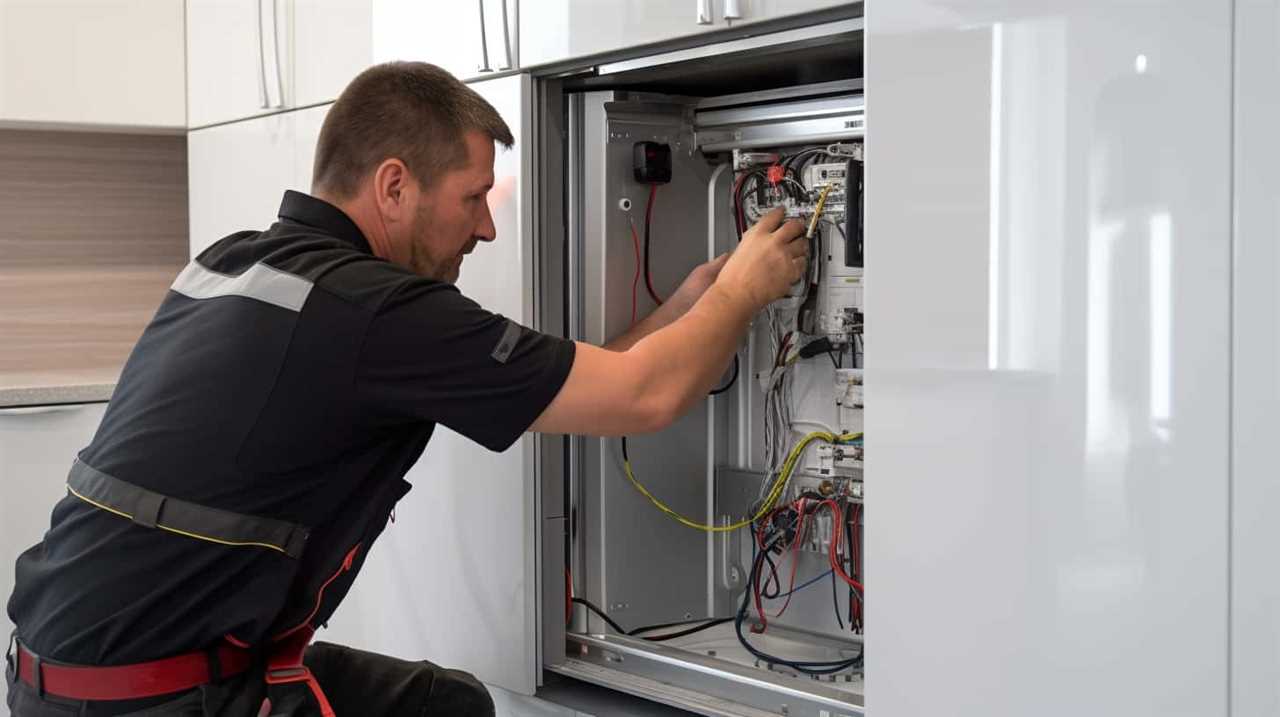
Promotion of Sustainable Living
Through the promotion and adoption of energy-efficient appliances, we can actively contribute to sustainable living practices. Energy-efficient appliances not only reduce our carbon footprint, but they also play a significant role in promoting renewable energy and sustainable housing design.
Here are five key ways in which energy-efficient appliances promote sustainable living:
- Reduced energy consumption: Energy-efficient appliances are designed to use less energy, which helps reduce our overall energy consumption. This leads to a decrease in greenhouse gas emissions and helps combat climate change.
- Promotion of renewable energy: By using energy-efficient appliances, we can reduce our reliance on non-renewable energy sources such as coal or natural gas. This encourages the development and adoption of renewable energy sources like solar or wind power.
- Sustainable housing design: Energy-efficient appliances go hand in hand with sustainable housing design. By incorporating energy-efficient appliances into the design of our homes, we can create more sustainable living spaces that are both environmentally friendly and energy-efficient.
- Lower utility bills: Energy-efficient appliances aren’t only good for the environment but also for our wallets. These appliances consume less energy, resulting in lower utility bills and long-term cost savings.
- Reduced demand on power grids: Energy-efficient appliances help reduce the strain on power grids by lowering overall energy demand. This can lead to a more stable and reliable energy supply, benefiting both consumers and the environment.
Frequently Asked Questions
How Do Energy-Efficient Appliances Contribute to the Reduction of Waste Production?
Energy-efficient appliances contribute to the reduction of waste production by conserving resources and minimizing landfill waste. By using less energy, these appliances decrease the demand for energy production, which in turn reduces the amount of waste generated from the extraction and burning of fossil fuels.
Additionally, energy-efficient appliances often have longer lifespans, reducing the need for replacement and further waste.
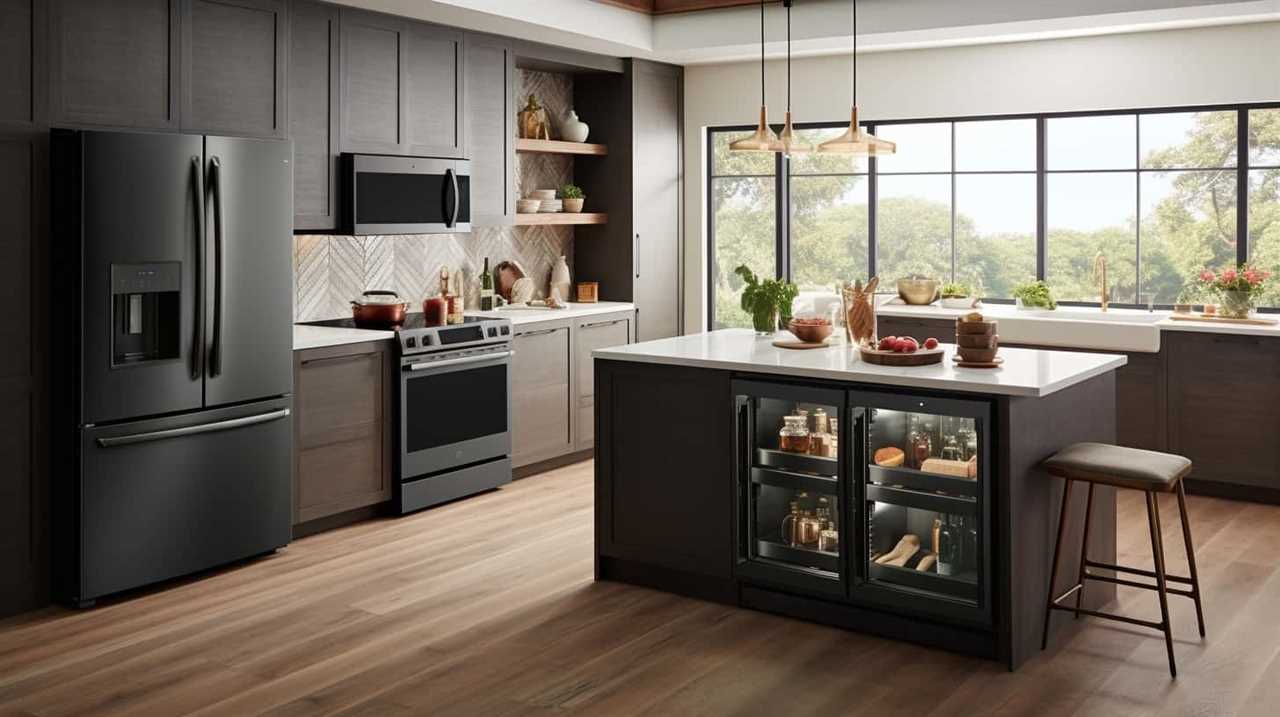
What Are Some Examples of Natural Resources That Are Conserved Through the Use of Energy-Efficient Appliances?
Using energy-efficient appliances conserves valuable natural resources and leads to significant energy savings. By reducing the amount of electricity consumed, these appliances help preserve resources like coal, oil, and natural gas.
This conservation is essential for our environment as it minimizes the extraction and burning of these resources, reducing greenhouse gas emissions and air pollution.
Additionally, energy savings translate into financial savings for individuals and businesses, making energy-efficient appliances a win-win solution for both the environment and our wallets.
Can Energy-Efficient Appliances Help in Decreasing Water Usage? if So, How?
Yes, energy-efficient appliances can help in decreasing water usage. By incorporating advanced technologies and designs, these appliances use less water in their operations compared to traditional models.
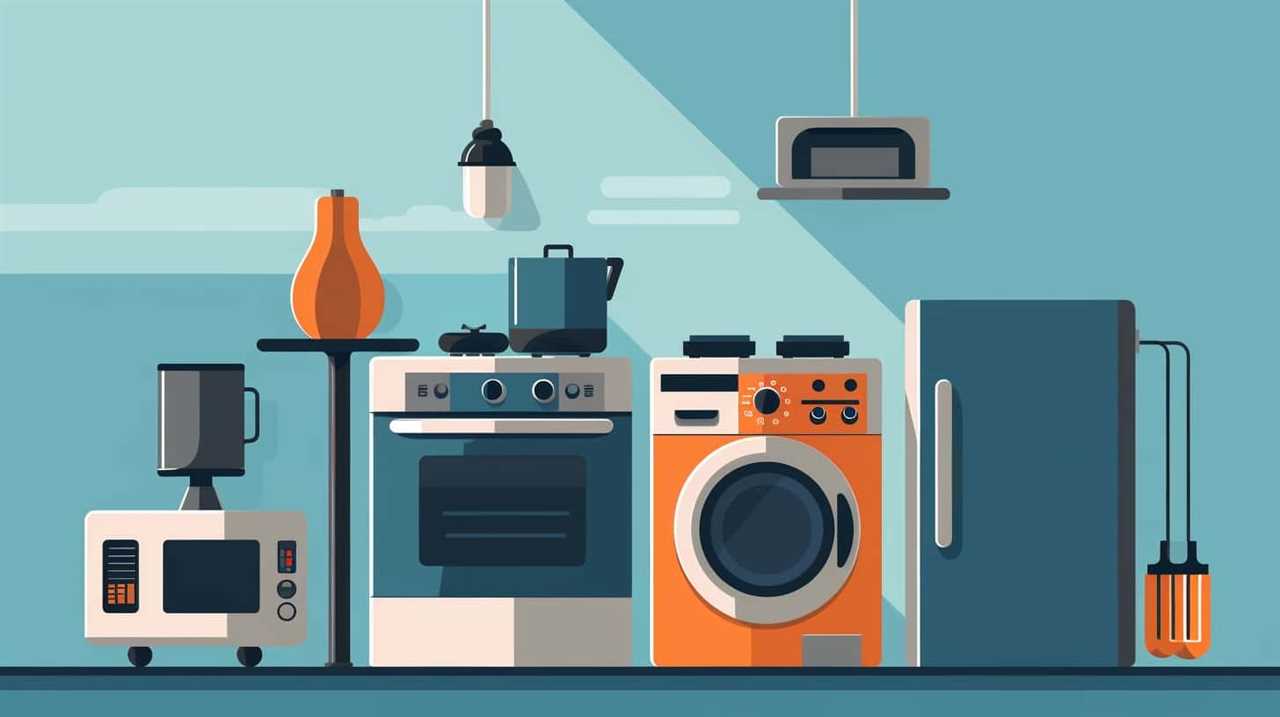
For instance, energy-efficient dishwashers and washing machines are designed to optimize water usage, ensuring that only the necessary amount of water is used during each cycle. This not only saves water but also reduces the energy required to heat the water.
What Is the Impact of Energy-Efficient Appliances on Indoor Air Quality?
Improved ventilation and health benefits are two key impacts of energy-efficient appliances on indoor air quality. These appliances are designed to optimize air circulation and remove pollutants, resulting in cleaner and healthier indoor environments.
By reducing the presence of harmful particles and improving air flow, energy-efficient appliances contribute to the overall well-being of occupants.
This data-driven approach to indoor air quality is essential for those seeking mastery in creating a healthier living space.

How Do Energy-Efficient Appliances Promote Sustainable Living?
Energy-efficient appliances promote sustainable living by reducing energy consumption and dependence on non-renewable energy sources. They help conserve natural resources and reduce greenhouse gas emissions, contributing to a healthier environment.
Additionally, energy-efficient appliances offer financial benefits by lowering utility bills, which can be especially helpful for low-income households.
Conclusion
In conclusion, it’s evident that energy-efficient appliances offer numerous benefits to the environment.
From reducing greenhouse gas emissions and air pollution to conserving natural resources and promoting sustainable living, these appliances are a step in the right direction.

With lower energy consumption and improved indoor air quality, we can mitigate climate change and protect biodiversity.
So, let’s embrace this sustainable energy consumption and make our planet happier, healthier, and more energy-efficient.
It’s time to turn on the power of green!
